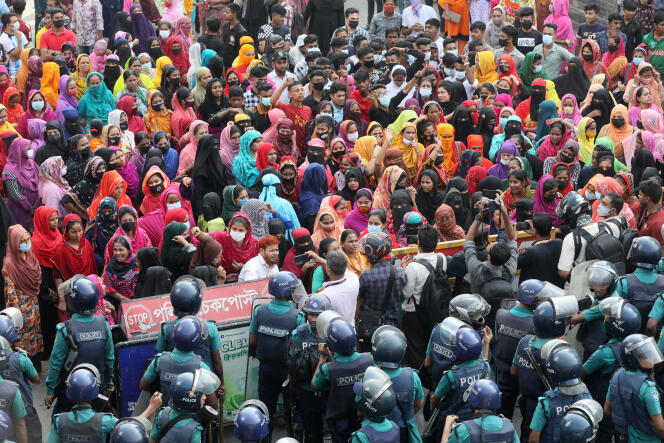


Standing barefoot on a long work table, a textile worker unfurls a large spool of blue fabric. It floats in the air for just a moment. This is where identically sized squares are cut from the cloth stamped "made in China". On the upper floor of this textile factory in Dhaka, Bangladesh, ready-to-wear garments are shaped to the mechanical sounds of sewing machines. Camouflage pants, red and white linen shirts and children's denim shorts are piled up by the dozen. Price tags are displayed in euros: €14.99 for a shirt, €16.90 for a blouse. These garments, made in Bangladesh for around a third of the retail price, will soon fill the shelves of German, Spanish, Italian and Dutch retailers.
At this APlus Group factory in Dhaka's Mirpur industrial district, employees – 95% of whom are women – were hard at work. But in late October, this unit of the Group, which employs 1,800 people, was closed for several days. Windows were smashed and vehicles damaged in violent protests in the textile industry. Thousands of workers took to the streets of Dhaka and the industrial suburbs of Gazipur and Ashulia to demand an increase in the minimum monthly wage, which until then had been set at 8,300 takas – or around €70. The unrest, during which dozens of factories were ransacked and four workers were killed, briefly paralyzed this key sector of the Bangladeshi economy, which supplies major brands such as Zara, H&M, Primark and Uniqlo.
The country hadn't experienced unrest like this in the last decade. The horrendous working conditions of Bangladesh's 4 million textile workers have deteriorated further since the Covid-19 pandemic. Hit hard by soaring inflation that neared the 10% mark, they are also suffering a depreciation of around 30% of the taka against the dollar, which has made it impossible for them to make ends meet.
"I used to eat meat, but now I make do with eggs and when I have to buy clothes, I skip meals to be able to afford them," said Munir Hussain, a man in his twenties who packages clothes for a salary of €70 a month at a factory that supplies the French company Kiabi, among others. "All my expenses are fixed; the only budget I can cut when I have extra costs is the one for food," explained the young man, who took part in the protests demanding higher wages.
Experienced workers earn barely more than he does. To feed her three children, Nassima Begum, who has been working on sewing machines for four years, has to work overtime: up to 110 extra hours every month to earn a total of around €130. "All we eat now is white rice with boiled potatoes, and if, by some misfortune, someone falls ill, we have to take out a loan to buy medicine," she said.
You have 70% of this article left to read. The rest is for subscribers only.
